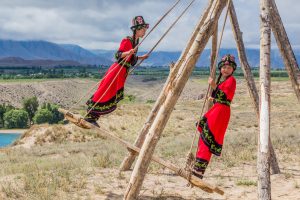In late June, Kyrgyzstan’s Constitutional Court reversed an earlier Supreme Court ruling and allowed for adult citizens to adopt a matronymic, a second name derived from one’s mother. The ruling sparked intense public debate in Kyrgyzstan, not only about the issue of naming and traditional values, but also about the role and power of the Constitutional Court.
The Constitutional Court’s examination of matronymics was the result of Altyn Kapalova’s efforts to give her children her own name in lieu of their fathers’. Kapalova, who is a museum curator and activist, has navigated Kyrgyzstan’s judicial system since December 2020 to advocate for the right to give her children her name.
Since the Constitutional Court’s ruling, Kapalova has received threats of violence, and Facebook groups for fans of the president have waged fierce debate about the cultural values reflected in matronymics. Government officials have criticized the concept of matronymics, saying no such thing exists and that it flies in the face of Kyrgyz traditional values.
In Kyrgyzstan, it is widely expected that people can recite their “jeti ata,” or “seven fathers.” The practice of sharing written and recited genealogies experienced a resurgence following Kyrgyzstan’s independence from the Soviet Union in 1991. These genealogies are universally patrilineal, with women only occasionally referenced as second wives. Critics argue that the introduction of matronymics disrupts the cultural practice of patrilineally-defined families and communities.
But heritable names are a relatively recent invention in Kyrgyzstan, and they reflect bureaucracy and legislative efforts just as much as cultural practices.
Patronymics were introduced in Kyrgyzstan only in the early years of Soviet rule. Nathan Light gives the example of Kyrgyzstan’s most famous writer, Chyngyz Aitmatov, whose patronymic Tölökulovich is derived from his father’s name. Chyngyz Aitmatov was born in 1928, ten years after the Soviet Union established power over what is now Kyrgyzstan. His father, Tölökul, was born in 1903; while he had a Russified family name, Aitmatov, his passport did not contain a second name, a patronymic, at all.
It is telling that Kyrgyz critics focus on gender as a threat to Kyrgyz traditional values rather than the persistent borrowing of Russian naming practices overall.
Russian-style second names are redundant with Kyrgyz family name constructions, which tack “uulu” or “kyzy,” meaning son or daughter in Kyrgyz, onto the father’s name. Journalists have tracked the pendulum swing of naming trends as Kyrgyz citizens change their names to or from the Russian-style family names that end with “-ov” or “-ova.” In recent years, around 30,000 people have adopted Russian-sounding last names annually for bureaucratic ease in the labor migration process. Whereas Tajik authorities banned newborns from having last names ending in “-ov” or “-skii” in 2016, Kyrgyzstan does not force either Russian or Kyrgyz style family names.
Kyrgyzstan’s Constitutional Court framed its decision to allow citizens to adopt a matronymic only after the age of 18 as a measure to protect children from social scorn and bullying. But other common naming practices in Kyrgyz culture have also been argued to stigmatize. Baby girls are frequently given names with meanings like “mistake,” “stop,” or “turn around” in hopes of inspiring the birth of a boy in the next pregnancy. Psychologists have raised concerns about the stigma that follows these names, but no judicial or legislative body has tried to block this practice.
Kyrgyz President Sadyr Japarov proposed legislation on July 17 that would allow the president to overrule the Constitutional Court if “the decision contradicts the moral and ethical values and public consciousness of the people of the Kyrgyz Republic.”
Legal analysts and civil society have criticized Japarov’s bill for attacking judicial independence. The Media Policy Institute, a Bishkek-based NGO, issued a statement about Japarov’s proposed bill as well. The Media Policy Institute criticized Japarov’s efforts as a “populist campaign” that could “lead to the creation of a personalistic autocratic system in which human rights will depend on the whims of individuals, and not on the norms of the Constitution and laws.”
The Media Policy Institute’s statement begins with a criticism of the hype around matronymics, given that it was already legal for Kyrgyz citizens to change their name as adults.
Opposition politician Dastan Bekeshev made a tangential lamentation about Kapalova’s push for matronymics opening the door to a presidential power grab. In a Telegram post on July 17, Bekeshev wrote, “For the majority, matronymics are more frightening than the possibility of twisting and turning the Constitutional Court.” Other reporting on Bekeshev’s Telegram post translates his criticism of the Constitutional Court’s fate as being “neutered,” but he used the word “castrate” to describe the consequences of the hype around matronymics. “The Constitutional Court is being castrated and turned into a daughter,” he wrote.
The potential blurring of checks and balances and concentration of power under the president are concerning developments, no doubt. But a male politician invoking castration and tropes about the weakness of daughters in response only further entrenches the hold of patriarchal institutions.

































